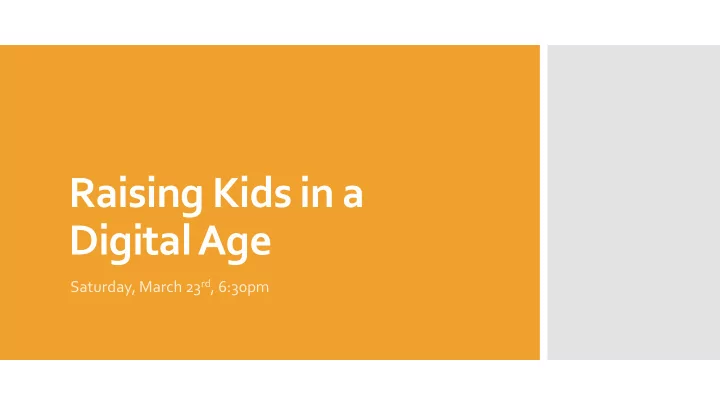

Raising Kids in a Digital Age Saturday, March 23 rd , 6:30pm
How old were you when you first went on the internet on a handheld Turn & device? Talk
Raising Kids in a Digital Age Saturday, March 23 rd , 6:30pm
Understanding the Digital World How is it impacting younger Preview generations? Navigating this world with kids Resources and Tools
Digital Natives & Digital Immigrants
Today’s 12 th graders spend 6 hours a day with new media Today’s 8 th graders spend 5 hours a day with new media (New Media: texting, internet, gaming, video chat)
Very Young children (ages 0-4) : The There is evidence that using a smart phone or tablet to pacify young children Digital might have a detrimental effect on their social and emotional development. Brain In particular: self-regulation, resilience, coping skills
Reading Habits: In the late 1970s nearly every The teen read a book or magazine nearly every day. Digital By 2015, only 16% did. Brain 1/3 of high school seniors admitted they had not read a book for pleasure in the past year.
“I’m not a really big reading person. It’s hard for me to read the same book for The such a long time. I just can’t sit still and be super-quiet. We have to read for Digital twenty minutes a day, and if a book takes a while to get interesting, it’s really hard Brain for me to read.” -12 Year Old
The SAT Scores have slid since the mid Digital 2000s, especially in writing and critical reading. Brain
Other studies have concluded that heavy smartphone use: The Steals mental focus and erodes Digital attention and concentration Weakens memory skills and inductive Brain reasoning Causes fatigue and irritability
Digital Cocaine: The Digital Studies compare online gaming and social media’s impact on the brain to Brain Cocaine’s impact on the brain (in terms of their production of dopamine).
Relational Habits The iGen spends more of its leisure time Digital alone than previous generations. Brain More time online → More time alone.
“My generation lost interest in socializing in person —they don’t have The physical get-togethers, they just text Digital together, and they can just stay at home.” Brain Kevin, age 17
“People party because they’re bored— The they want something to do. Now we Digital have Netflix.” Brain Nick, age 18
“It’s so tempting to just text someone or to just go on social media and like The someone’s photo and comment instead of calling and being like, ‘Hey, do you Digital want to go and get something to eat?’ That takes planning.” Brain Darnell, age 20
The Multiple studies are showing links between heavy screen time and higher Digital levels of anxiety, depression and Brain loneliness.
The Digital Brain
8 th and 10 th graders: The Digital 31% more felt lonely in 2015 than in 2011. Brain
“At school, people are quieter. They all are on their technology ignoring each other. I am dissatisfied with my life The because a lot of my friends are addicted Digital to their phones — they seem like they do not want to talk to me because they are Brain on their phone.” Olivia, 18
The Digital Brain
8 th graders who are heavy users of social The media increase their risk of depression by 27%. Digital Brain 15% more teens experienced a major depressive episode in 2015 than in 2010.
The Digital Brain
The Digital Brain
Percentage of Teens who get less than 7 hours of sleep on most nights: The 1991: 25% Digital 1997: 34% Brain 2012: 33% 2015: 42%
Has anything surprised you so far? Turn & Talk
Now Parents need to help their children practice discernment and create What? healthy boundaries around technology.
Now What?
Talk with your kids! Answer the WHY questions Now Have values-based conversations What? about technology Ask kids for their input
Steps to Dealing with Digital Addiction Confront the problem Monitor computer/device use, set REAL limits Schedule face-to-face time with family & friends (device-free!) Now Replace online time with other activities and hobbies that are physical and social What? Consider all your options (no phone, dumb phone, limited use) Install parental controls or accountability software on your computer and all devices Get help from a counselor
Now Live an Embodied Life Together What?
Now Practice what you preach! What?
Our goal is to raise wise, Now discerning adults who can set boundaries and live an What? embodied, full life!
Resources
Resources
Resources
Resources
Q & A
Table Group Discussions Please close in prayer on your own. Thanks for coming!
Recommend
More recommend